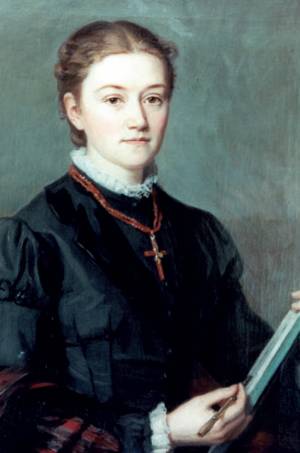


She was a self-taught woman who learned from her brother's books and studied the surface tension of liquids while washing dishes. The British scientist Lord Rayleigh helped Agnes Pockels to break through. After all, she was allowed to do research at the Technical University of Braunschweig.
Agnes Luise Pockels was born on February 14, 1862 in Venice as the daughter of Alwine and Theodor Pockels, an Austrian professional officer. Her brother Fritz was born three years later in Vincenza. The malaria, which was rampant in the region at the time, did not spare the Pockels family either and ultimately led to the father's early retirement.
In 1871 the family moved to Braunschweig, where Pockels attended the municipal secondary school for girls. The young woman gave up studying to look after her ailing parents. Nevertheless, with the help of the physics textbooks of her brother, who later became a physics professor, she autodidactically developed into a scientist and made significant observations on the surface tension of liquids - almost while washing dishes on a daily basis. To investigate the phenomenon, she invented the slide chute, which is still used today, in 1882, which the American researcher Irving Langmuir (1881-1957) developed into the Langmuir-Pockels film balance. Langmuir received the Nobel Prize in 1932 - some of his findings were based on Pockel's experiments.
Pockels made an important contribution to the elucidation of interface phenomena. As a scientific outsider she feared that German journals would reject her publication, in 1891 she turned to the English physicist and later Nobel Prize winner John William Strutt (1842-1919), known as Lord Rayleigh. A lively correspondence developed and finally Pockel's work was published in the journal "Nature" with Rayleigh's recommendation. Pockels also made this known in Braunschweig. From then on she was allowed to work at the physical institute of the Technical University of Braunschweig and was also invited to scientific lectures. On January 27, 1932, Pockels was the first and to this day only woman to receive an honorary doctorate from the Technical University of Braunschweig for her groundbreaking research on surface chemistry - an extraordinary honor for an autodidact.
Agnes Pockels died on November 21, 1935 at the age of 73 in Braunschweig. Since 1993, the Technical University of Braunschweig, as the university is called today, has awarded the Agnes Pockels Medal to people who have made outstanding contributions to promoting women in research and teaching.
a notice
The texts published in this series do not claim to be scientific publications. Authors and other people involved are not experts in the history of science. The purpose of the series is to introduce the mostly unknown women chemists and to remind you of the well-known women chemists. We encourage readers who want to know more to study academic Literature on the women featured. In some cases there are detailed chemical-historical works.
authors
Prof. Dr. Eberhard Ehlers
Prof. Dr. Heribert Offermanns
Editorial processing
Dr Uta Neubauer
project management
Dr Karin J. Schmitz (GDCh public relations)
The authors are responsible for the content of the biographies.
The content presented on these pages has been carefully compiled. However, the authors, Editorial staff and publishers assume no responsibility or liability for the completeness and correctness of the content or for typographical errors.
Photo: Unknown author, Agnes Pockels ca1892, marked in the public domain, details on Wikimedia Commons
back to overview biographies of women chemists
back to publications
This page has been machine translated. If you have any feedback or comments please feel free to contact us. 
last modified: 28.05.2021 13:17 H from M.Fries